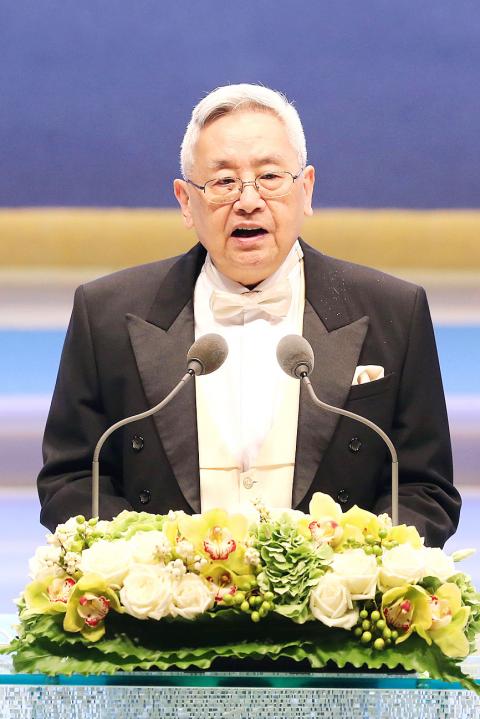Chinese-American historian and Tang Prize laureate Yu Ying-shih (余英時) yesterday reiterated his support for and admiration of Taiwan’s Sunflower movement.
“I was very touched by the Sunflower movement a while ago… the students did not leave the legislature until they thoroughly cleaned up the place and they left peacefully,” the Princeton University emeritus professor said during a talk in Taipei on the importance of cultivating humanistic qualities in modern society.
“It was a remarkable movement,” the 84-year-old China-born academic said.

Photo: CNA
The Sunflower movement refers to student-led protests in March and April this year against the way a trade in services agreement with China was handled by the Chinese Nationalist Party (KMT) government. The protesters occupied the legislature for almost 23 days and at one point stormed the Executive Yuan building, drawing mixed but mostly sympathetic reactions from the media.
In a press conference a day earlier, Yu, although approving of the students’ opposition, stopped short of expressing full support for the demonstrations, saying he is against “violent protests” in a democratic society.
In yesterday’s speech, Yu said that he had no intentions of “appeasing” people or asking them “not to rebel.”
He said citizens in a democratic society should protest and express their dissatisfaction with the government, but in a peaceful way, because if all efforts fail, they can still resist the government with their ballots.
Yu, an outspoken critic of the Chinese government, said Taiwan’s democratization process has great significance in Chinese history because China’s dynastic changes and power shifts have always been compelled by military force.
Taiwan’s democracy broke that cycle of violence and counters the saying that Chinese culture is opposed to the ideas of democracy, freedom and equality, he said.
In fact, he said, the first people who brought the idea of democracy to China were academics influenced by Confucianism, such as Kang Youwei (康有為, 1858-1927) and Yan Fu (嚴復, 1854-1921), proving that traditional Chinese thinking was not against democracy.
The concept of democracy also appears in a book by Chinese scholar Huang Zongxi (黃宗羲, 1610-1695), in which Huang condemned autocratic rule and proposed using schools to hold discussions on public affairs, he said.
Yu is the first winner of the Tang Prize in Sinology. In addition to his scholarly pursuits, Yu is an outspoken supporter of the democracy movement in China and is known to have sheltered young refugees who fled China after the Tiananmen Square Massacre in 1989.

Intelligence agents have recorded 510,000 instances of “controversial information” being spread online by the Chinese Communist Party (CCP) so far this year, the National Security Bureau (NSB) said in a report yesterday, as it warned of artificial intelligence (AI) being employed to generate destabilizing misinformation. The bureau submitted a written report to the Legislative Yuan in preparation for National Security Bureau Director-General Tsai Ming-yen’s (蔡明彥) appearance before the Foreign Affairs and National Defense Committee today. The CCP has been using cognitive warfare to divide Taiwanese society by commenting on controversial issues such as Taiwan Semiconductor Manufacturing Co’s (TSMC, 台積電) investments in the

INVESTIGATION: The case is the latest instance of a DPP figure being implicated in an espionage network accused of allegedly leaking information to Chinese intelligence Democratic Progressive Party (DPP) member Ho Jen-chieh (何仁傑) was detained and held incommunicado yesterday on suspicion of spying for China during his tenure as assistant to then-minister of foreign affairs Joseph Wu (吳釗燮). The Taipei District Prosecutors’ Office said Ho was implicated during its investigation into alleged spying activities by former Presidential Office consultant Wu Shang-yu (吳尚雨). Prosecutors said there is reason to believe Ho breached the National Security Act (國家安全法) by leaking classified Ministry of Foreign Affairs information to Chinese intelligence. Following interrogation, prosecutors petitioned the Taipei District Court to detain Ho, citing concerns over potential collusion or tampering of evidence. The

‘COMPREHENSIVE PLAN’: Lin Chia-lung said that the government was ready to talk about a variety of issues, including investment in and purchases from the US The National Stabilization Fund (NSF) yesterday announced that it would step in to staunch stock market losses for the ninth time in the nation’s history. An NSF board meeting, originally scheduled for Monday next week, was moved to yesterday after stocks plummeted in the wake of US President Donald Trump’s announcement of 32 percent tariffs on Taiwan on Wednesday last week. Board members voted to support the stock market with the NT$500 billion (US$15.15 billion) fund, with injections of funds to begin as soon as today. The NSF in 2000 injected NT$120 billion to stabilize stocks, the most ever. The lowest amount it

NEGOTIATIONS: Taiwan has good relations with Washington and the outlook for the negotiations looks promising, Minister of Economic Affairs J.W. Kuo said Taiwan’s GDP growth this year is expected to decrease by 0.43 to 1.61 percentage points due to the effects of US tariffs, National Development Council (NDC) Minister Paul Liu (劉鏡清) said at a meeting of the legislature’s Economics Committee in Taipei yesterday, citing a preliminary estimate by a private research institution. Taiwan’s economy would be significantly affected by the 32 percent “reciprocal” tariffs slapped by the US, which took effect yesterday, Liu said, adding that GDP growth could fall below 3 percent and potentially even dip below 2 percent to 1.53 percent this year. The council has commissioned another institution